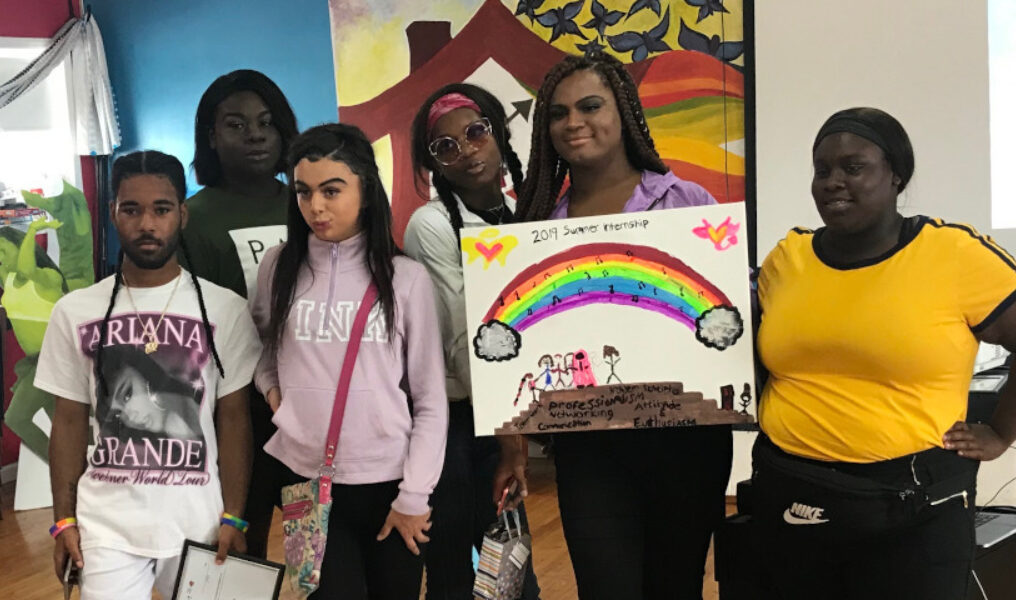Specializing in trauma-informed care for Detroit's LGBTQ runaway and at-risk youth of color, The Ruth Ellis Center has long focused on building strong relationships with the community it serves. Now, because of a $50,000 grant from the charitable arm of Fiat Chrysler Automobiles, the FCA Foundation, the nonprofit will have the tools to expand upon its existing career- and life skills-building services. Christine Estereicher is the FCA Foundation director of civil engagement and state affairs. She said that ideally the grant will help to "build strong and sustainable communities."
"Providing opportunities for young people to develop the skills necessary to succeed in school and life is key in this regard, and complements FCA's longstanding commitment to LGBTQ+ employees, communities, customers and issues," she said.
Executive director of REC Jerry Peterson said that this grant will help "push forward" REC's existing education and employment services.
"Most of the young people that we serve have experienced pretty high levels of trauma, and those trauma triggers become really serious issues in their ability to manage their emotions at work and self-regulation," Peterson said. "They're very bright and capable people, so they're able to get jobs. But too frequently they'll lose the job or they'll drop out of an educational opportunity because of the more soft skills that are involved in how you build relationships and how you connect with people and how you manage those relationships at work."
To combat that issue, REC has used its grant funding to create a three-tiered curriculum that focuses on building foundational work skills, skill-share education, includes a paid internship and opportunities for longer-term positions at the center.
Three Levels of Engagement
The program's first level focuses on foundational community work skills development. This level of the grant-funded program will allow REC to hire a person to focus primarily on soft skill development like interviewing, resume-building, working through on-the-job conflicts and LGBTQ legal resources to aid employment. Participants will attend on alternating days from the REC Drop-In Center.
"Level one is really for any young person who wants to be engaged in these activities and move forward with their lives," Peterson said.
The next level progresses into a nine-week paid summer internship open to LGBTQ young people aged 16 to 30. Hard skills will be introduced in this portion of the program like team-building, working at REC's Drop-In Center and acting as staff in other capacities at the Center. Peterson said that those interested in participating in the program's second level do not have to have experience with level one.
"So, they will actually apply for the positions that are available, and those positions will be stipended positions," Peterson said. "And then people who have gone through the summer internships have the opportunity to apply to the peer leader program, which is a two-year more intensive engagement of up to four or so young people who become actual part-time employees of the Ruth Ellis Center."
That peer leadership program is the third level, and it will build significantly on the skills-building and requirements of level two.
"Once you move into level two and three, the expectation is that you're going to be connecting with case management and you're going to be working with case management to develop individualized plans of service. And it really is that individualized plan of service that derives the kinds of experiences and so on that the internship and the peer leader program incorporate," Peterson said. "So, every year those programs might look at little bit different depending on the goals of the people who are participating, because this is really about maximizing their success."
A "Person-Centered" Approach
Peterson emphasized that both the customizability of the program and its gradual increase in requirements is vital to its success.
"I think really, one of the most important things is to understand that young people who don't, in their lived experience, live with a lot of structure really struggle with structure. And gradually, the reason this is a three-tiered program, we're introducing higher levels of structure and helping young people think through how they navigate those structures and how they show up and how they relate to structures," he said. "And in ways that's not harmful to who they are and also allows them to be successful in the world. And navigating that kind of code-shifting process can be challenging."
Peterson added that those who will excel in this grant-funded program will be people eager to grow their marketable skills while connecting with others around them.
"So the people who move through all three levels here are going to be people who really want to both become really confident in their own identity and own skills and be ready to connect with the general workforce population and figure out how to make that transition successfully."
To find out more about this program and REC visist ruthelliscenter.org.










